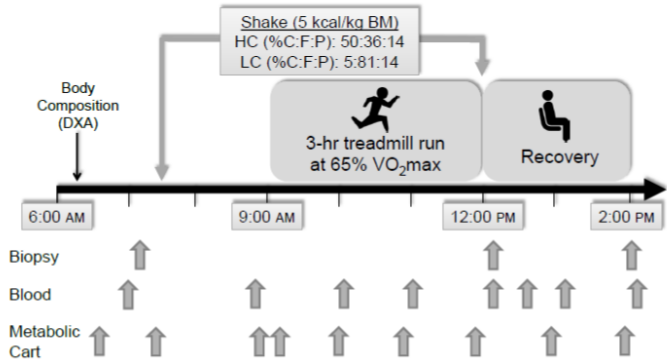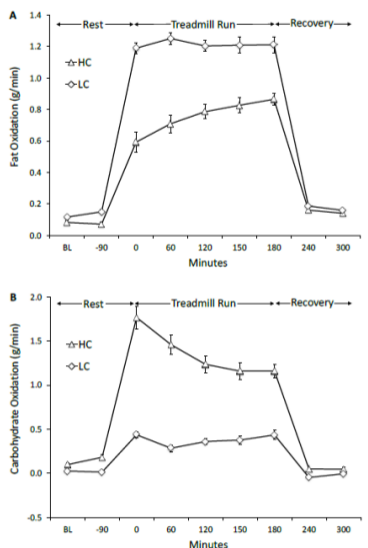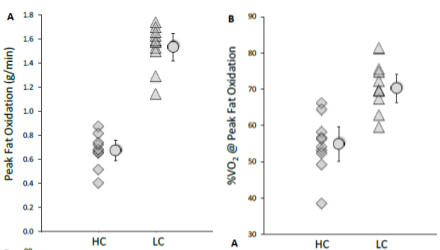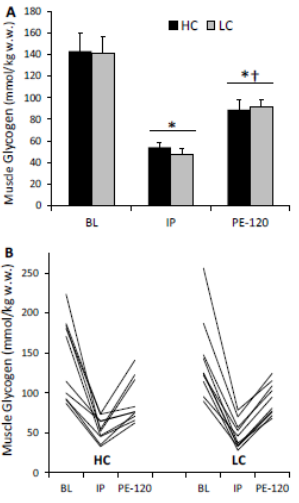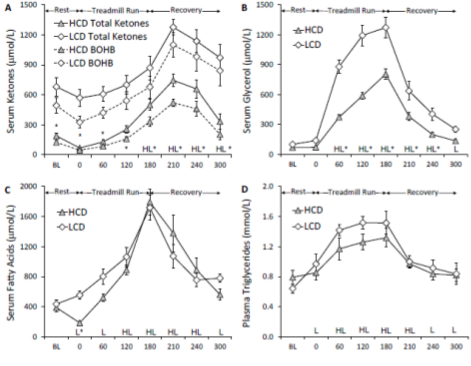Keto-Adaption doesn’t mean sacrificing normal glycogen levels (*study)
When you eat a ton of carbs to fuel your training, you become less efficient at burning other macronutrients during training and competition. But is the opposite true? Intuitively, we’d think so. If you rely primarily on fat and protein, and eat very little carbohydrate, you’d adapt in the same way, i.e. you’d start producing and burning ketones, while your glycogen levels get buried.
In a recently published study , two groups of similarly trained, competitive, ultra-endurance athletes with vastly different fueling strategies were examined. One group was a low-carb group of keto adapted athletes, and the other group consumed the more traditional endurance athlete fare of high-carbs (for reference, they ingested 6x more carbohydrates than the other group). Each had been consuming this type of diet for anywhere from 9-36 months, respectively.
The athletes underwent two days of testing. On day one, fat oxidation was determined by having the subjects perform a maximal oxygen consumption test. On the second day, the athletes ran for three hours on a treadmill at 64% of their maximal score from day one. Metabolic responses were recorded before, during, and after their three hour run.
Prior to the maximal oxygen consumption test, the subjects had baseline measures taken, and drank a shake (5 kcal/kg body mass) with macronutrients distributed in accordance with their standard intake, i.e. the keto group consumed a shake with a carbohydrate:fat:protein percent of 5:81:14, with the other group’s shake registering at 50:36:14 (the average was 343 and 332 calories, respectively); Ingredient percentages varied, but both shakes contained heavy cream, olive oil, whey protein, walnut oil, and strawberries, with the higher carb shake also containing banana and agave syrup. After running for three hours, they consumed an identical shake.
It should come as no surprise that the keto group burned a far higher percent of fat to fuel their run, while the carb group was metabolizing carbohydrates:
Peak fat oxidation was an average of 2.3x higher in the keto group group, while and the percent of maximal aerobic capacity where peak fat oxidation occurred was also significantly higher.
Ratings of exertion and (average percent maximum) oxygen consumption were similar between the two groups. After training, muscle glycogen was significantly (and similarly) decreased in both groups – the keto group being depleted by 66% immediately post-exercise and 34% at two hours afterwards, the high-carb group being delpeted by 62% immediately post-exercise and 38% at 2 hr post-exercise. This is counterintuitive, as we’d expect the keto group to show significantly different muscle glycogen metabolism from a high-carb-fueled group, but that wasn’t the case. So what we’d have assumed previously about glycogen depletion in keto-adapted athletes, turns out to be completely incorrect – and they are able to maintain (and replenish) muscle glycogen levels roughly equal to athletes consuming tons of carbs – but without the carbs:
And finally, keto-adapted athletes had ~3x higher levels of total ketones at at all points. Ketone levels increased progressively during exercise and peaked during recovery – which, again, is amazing when viewed in the context of their relatively “normal” muscle glycogen levels:


